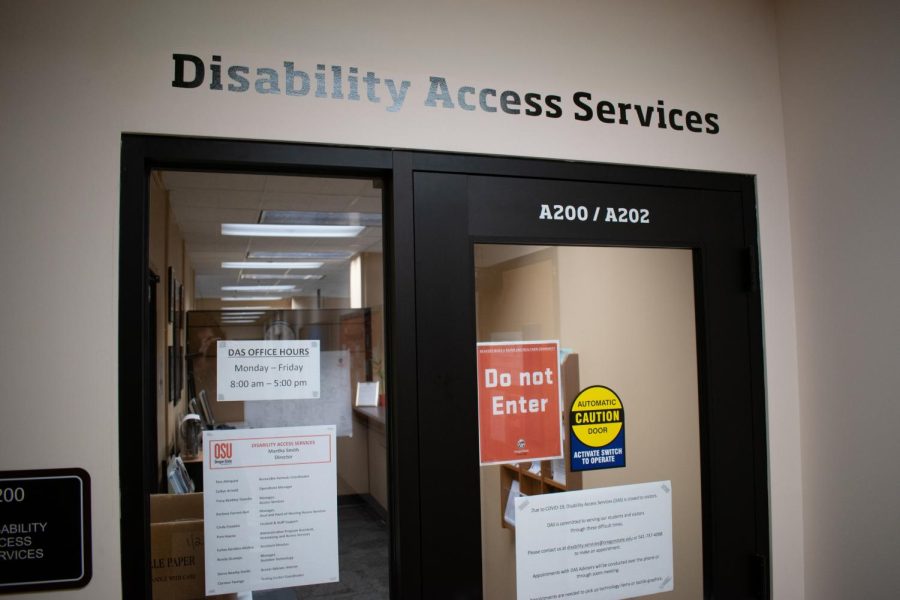The Rainy Angle: Immunocompromised students should reach out to Disability Access Services
February 7, 2022
 Editor’s Note: This column does not represent the opinion of The Daily Barometer. This column reflects the personal opinions of the writer.
Editor’s Note: This column does not represent the opinion of The Daily Barometer. This column reflects the personal opinions of the writer.
A heavy fever and vomiting: as an immunocompromised student at Oregon State University, that’s what having a cold is like for bioengineering major Alec Snyder.
For Snyder, this means needing to stay home where he’s safe to recover, but that results in missed class and possible
grade penalties.
These policies make sense as a means of keeping students coming to class, especially in the case of lab-heavy courses, but they leave no room for immunocompromised students to keep themselves safe if they fall ill. With COVID-19 cases still rising in Oregon, it’s important to stay home when you’re sick. If you’re especially susceptible, even more so.
Considering the circumstances, departments with such policies should consider their stance on these penalties. As they stand right now, these policies incentivize students to push through symptoms and expose others to their illness.
Instead of simply being an inconvenience, illnesses for immunocompromised students can make it impossible to go to class as it puts these students at risk of catching a deadly disease if they go to class sick. Additionally, even minor illnesses are enough to make classmates and teachers weary.
As we enter the third full year of the pandemic, immunocompromised students are encouraged to check in with OSU’s Disability Access Services so they can ensure that they don’t face penalties for absence due to illness.
We’ve proven now that hybrid options can help students with mild symptoms to not miss too much class, but this blanket solution is still difficult for deaf or partially deaf students, as auto-generated closed captions rarely do a good job transcribing what professors are saying and webcam issues can make it difficult to lip-read.
“I would say, most of the time when people don’t go to class it’s because they’re feeling so bad that they can’t go to class and typically sitting at a desk is too much,” Snyder said. “When I was sick, there was no way I was going to be able to sit at a desk and stare at a computer for an hour.”
DAS, located in Kerr Administration, can help students begin the process of finding accommodation and protecting themselves from penalties.
DAS provides drop-in Zoom sessions where people can ask questions. This Zoom session is linked on the DAS website, along with information on applying for accommodations and is a great tool for getting in touch with a DAS adviser.
However, the responsibility of finding this information should not fall solely on the student, but DAS needs help reaching the students who need them.
“In DAS and to my knowledge, OSU does not have separate policy specifically for immunocompromised students—or employees for that matter,” said Martha Smith, director of DAS. “So if a student was wanting, needing or claiming they needed different attendance policies because of their health condition, then they would go through us like any other student with a health issue.”
According to Smith, DAS has seen an almost 20% increase in the number of students served since 2020. Resources like DAS have always been critical for student success and need to be supported. Part of that support needs to be making students and staff aware of the resources available.
For instance, immunocompromised students can request an accommodation that allows for attendance policy to be modified so they won’t receive penalties to their grades. This would allow the student to take time and safely recover from illness before re-entering the classroom.
“Even if we, DAS, make it so that you’re not docked points for missing the class, you’re still accountable for the information that occurred in that class,” Smith said. “You’re still accountable for doing whatever the assignment was or taking the quiz—even if it means at a later date—or taking the test or doing the presentation.”
There is no set list of accommodations available. DAS offers students accommodations based on what may work for that individual, but are open to suggestions. What may work for one student may not work for another. But if you have questions about DAS, you should go in or use the drop-in Zoom session to get your questions answered. Asking friends is a good idea, but asking the people who can actually make the changes you need is better.






















































































































